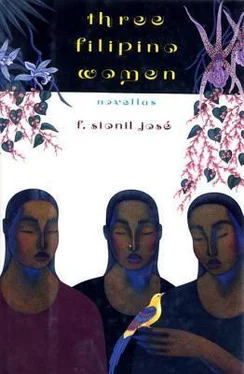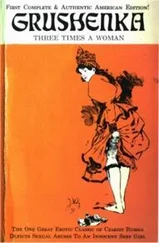Francisco Jose - Three Filipino Women
Здесь есть возможность читать онлайн «Francisco Jose - Three Filipino Women» весь текст электронной книги совершенно бесплатно (целиком полную версию без сокращений). В некоторых случаях можно слушать аудио, скачать через торрент в формате fb2 и присутствует краткое содержание. Год выпуска: 2013, ISBN: 2013, Издательство: Random House Publishing Group, Жанр: Современная проза, на английском языке. Описание произведения, (предисловие) а так же отзывы посетителей доступны на портале библиотеки ЛибКат.
- Название:Three Filipino Women
- Автор:
- Издательство:Random House Publishing Group
- Жанр:
- Год:2013
- ISBN:978-0-307-83028-9
- Рейтинг книги:4 / 5. Голосов: 1
-
Избранное:Добавить в избранное
- Отзывы:
-
Ваша оценка:
- 80
- 1
- 2
- 3
- 4
- 5
Three Filipino Women: краткое содержание, описание и аннотация
Предлагаем к чтению аннотацию, описание, краткое содержание или предисловие (зависит от того, что написал сам автор книги «Three Filipino Women»). Если вы не нашли необходимую информацию о книге — напишите в комментариях, мы постараемся отыскать её.
and
-examine the Philippine experience through the lives of three female characters, a prostitute, a student activist, and a politician.
Three Filipino Women — читать онлайн бесплатно полную книгу (весь текст) целиком
Ниже представлен текст книги, разбитый по страницам. Система сохранения места последней прочитанной страницы, позволяет с удобством читать онлайн бесплатно книгу «Three Filipino Women», без необходимости каждый раз заново искать на чём Вы остановились. Поставьте закладку, и сможете в любой момент перейти на страницу, на которой закончили чтение.
Интервал:
Закладка:
On our way out, we passed couples necking in the dark, behind abutments in the old wall, on the grass, almost everywhere and she said it was the first time she had seen such sights.
“They have no money,” I said. “Perhaps, they are students or office workers. If they had money, they would go to the motels.”
“Would you like to take me to one?” she asked, holding on to my arm.
“Of course,” I said. “But I cannot afford you. Only my clients can and they can write it off their income tax as entertainment. I am heavily in debt.”
“Coward,” she whispered as she pulled me to an empty bench near the fountain. And it was then that she asked, “Roly, do I look like a prostitute?”
It was a question I least expected from her, this girl who was brash, who was rich now and who made playthings of men. She had always dressed with simplicity, she was bright, she talked intelligently. It was an instant wherein her life, the sorrow she had to bear, suddenly became luminous and clear. I wanted to embrace her, protect her; it was a feeling completely shorn of desire. It was truly, sincerely love.
“No, Ermi,” I said. “You don’t look like a whore. You will make a man very happy one day …”
“I want to get out,” she said. “Start a new life. I know how to cook a bit, and bake. One day, you should taste my chocolate cake. It is my favorite. I will open a small restaurant, I don’t know where. I will make a different kind of living.”
Her dream gladdened me. She had a future mapped out and it would not be in Ermita. She had started there, she would not end there. I had talked with bar girls, sauna parlor attendants along M.H. del Pilar Street and all of them went into prostitution with the same squalid story, of having been left by their husbands or boyfriends to care for their babies, of having to support brothers and sisters or parents who were no longer capable of earning a living. There was no one I met who went into the trade out of a strong psychological need or for the love of sensuality itself.
I returned to Padre Faura and bought a dozen cookbooks, the best recipes as concocted by the outstanding chefs of Europe. I also got books on how to make canapés, desserts, salads. Now, all she needed for her restaurant was the staff. I was sure that she already had the money to start a modest one. I drove over to Cubao with the bundle and knocked on the iron gate. Her maid recognized me and opened it. I did not linger as if waiting for an invitation to come in.
That night, while I was working on my notes on sexuality in our folk songs, the phone rang.
“Thank you for the books,” Ermi said gaily. “When I start that restaurant, you will be my official taster.”
“Thanks for the job,” I said. “I wish you would assign me something less meaningful. After all, I cannot be your sugar daddy …”
Before Christmas that year, there was another influx of inquiries from American financing institutions and one of my visitors included Andrew Meadows from Atlanta, a clean-cut type with teeth good enough for a toothpaste ad, and reddish hair. He was in his late forties. One evening, while we were having dinner at Bon Vivant in Ermita, he was musing aloud about how he was put off by one of the girls he had brought to his room at the Hilton. That same evening, I sent him to Camarin. It was obvious that he was extremely pleased after the Camarin introductions for he never bothered me again about his asinine evenings.
We did talk, however, about how different Filipino hookers were compared to those in the United States. “There is always something very feminine about them,” he said. “Most of those in America are just plain hustlers. They never give men a chance at either illusion or romance …”
He was also amused by the government campaign against “indecent” publications, pornographic movies which were really tame compared to what was shown in New York. And it struck him as outrageously foolish — having to blot out the shapes of guns, knives and other weapons in movie ads when these were recognizable anyway. I told him such campaigns were often a camouflage for the insincerity and insecurity of our highest officials. We have always been earthy like all people in feudal, agrarian societies. We who are close to the land regard sex and procreation as natural as eating. Take any village boy; he will recite limericks that are obscene by middle-class standards. All the folk songs I learned when I was young were obscene but no one objected to them, least of all government officials.
In prewar Manila, the highest officials lived graciously, visiting houses of pleasure that offered them relaxation otherwise not available in their own bedrooms.
There is something revolting about photographs of people doing what they should in the privacy of their bedrooms. What is objectionable is not a matter of morality but of taste and, in this sense, the public display of private parts and functions. Magazines like Playboy are sold openly in Manila’s plush hotels, in Angeles. Porno shops in Tokyo, London, in Scandinavia and, of course, New York’s Forty-second Street operate for adults. They are seen not as evil but as aesthetic nuisances which, in truth, they are.
The obscenities in this country are not girls like Ermi, either. It is the poverty which is obscene, and the criminal irresponsibility of the leaders who made this poverty a deadening reality. The obscenities in this country are the palaces of the rich, the new hotels made at the expense of the people, the hospitals where the poor die when they get sick because they don’t have the money either for medicines or services. It is only in this light that the real definition of obscenity should be made. There is so much dishonesty today, not just in government but in business. Perhaps, sex is the only honest thing left.
I believed in these conclusions but, looking back, I realized that I had not really done anything to buttress my thinking with action. I served the Establishment, the multinationals — promoted their welfare, and they held no responsibilities at all towards the banishment of our poverty. They were here to make money and nothing else. It was to their advantage that we remained poor, but since I was working for them, I had become comfortable.
In any case, I finally had three thousand pesos. I missed a few luncheon dates, scrimped on supplies, cut corners. I had a meeting in Baguio and I asked Ermi to go with me. “It will cost you a little bit,” she said, half mockingly.
I seldom drove to Baguio by then not only because the price of gasoline had soared but because I no longer trusted the old Mercedes to go that far without breaking down. She had told me that she would be at the bus station at seven-thirty and it was the longest thirty minutes of my life, waiting in that narrow room. She did not arrive and ruefully I went up the bus alone. When I arrived at the Pines that afternoon, the first thing I did was to place a call to her house — something I never did before because she told me never to call the number which I had inveigled from Didi.
“I overslept, Roly,” she said apologetically.
“Can you catch the three o’clock bus this afternoon?” I asked. “I will be at the station to meet you.”
“I will be there.”
It was only seven but I was already at the station, braced by the coolness of the mountains. What had attracted me to Ermi? I had asked this of myself every so often. Perhaps, it was her eyes — vibrant and clear and yet holding so much melancholy. I prided myself in the magnitude of my experience. I had told her that it was just as well that I was emotionally and intellectually mature so I could accept the reality of what she was. But if I had been twenty or so, without the understanding which only age and experience can create, I would probably have gone mad just thinking about the men she had. Or, being unable to accept this, I would probably commit suicide.
Читать дальшеИнтервал:
Закладка:
Похожие книги на «Three Filipino Women»
Представляем Вашему вниманию похожие книги на «Three Filipino Women» списком для выбора. Мы отобрали схожую по названию и смыслу литературу в надежде предоставить читателям больше вариантов отыскать новые, интересные, ещё непрочитанные произведения.
Обсуждение, отзывы о книге «Three Filipino Women» и просто собственные мнения читателей. Оставьте ваши комментарии, напишите, что Вы думаете о произведении, его смысле или главных героях. Укажите что конкретно понравилось, а что нет, и почему Вы так считаете.












